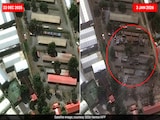At a workshop in IIT Madras, 45-year-old Nagamal a widow of a person engaged in manual scavenging is enthusiastically learning to operate a robotic septic tank cleaning machine. She would soon turn into an entrepreneur in Chennai operating this robotic technology - HOMOSEP, to clean septic tanks.
Her husband Kannan died inhaling poisonous gas when he got into a septic tank to clear the sledge twenty years ago. With two daughters life was difficult. Now she has roped in two others for her new venture after struggling as a housekeeping worker for more than a decade. She told NDTV “I am so happy that the first machine is given to me. I am so proud that with this I'd be able to save lives of say ten people.”
More than 900 people involved in manual scavenging have died since 1993 due to asphyxia while cleaning septic tanks. Commissioned by Safai Karamchari Andolan for a tech solution, Solinar a start up from IIT Madras developed this robotic system mounted on a tractor, in consultation with local communities.
The robotic arm with blades that can open up and close, reaches the bottom of the septic tank, crushes the sludge, mixes it and pumps the slurry out eliminating any manual entry.
Professor Prabhu Rajagopal, from the Department of mechanical engineering who is also a Co-Founder says, “Every district should have a designated set of self help groups who will get these machines and then get the cleaning contracts. Thus the problem can be eliminated for ever. Once the stigma also goes away then anybody can come in and take these jobs with these machines, do the job with dignity and earn their livelihood.”
Founded by a team of students and a faculty member at IIT Madras, the machine costs around Rs 20 lakh. CSR (Corporate Social Responsibility) funding helps many like Nagammal to own the machine. The team is also working on a compact model. Divanshu Kumar, CEO of Solinar, the start up said, "In the current compact version we are imagining that the de-sludging system, suction as well as the storage tank all can be fitted in one vehicle itself, that will make it very modular to take it even to far away places.”
For ages, few scheduled caste communities were forced to continue the practice of manual scavenging, violating human rights and dignity. Now widows of victims and women self help groups among them, are setting up enterprises for a dignified and empowered livelihood.
Ms Deepthi Sukumar, National Core Team Member, Safai Karamchari Andolan says, “Owning a technology that's giving a solution to this itself creates a huge history. For a person like Nagammal and Ruth Mary, everything changes for them. Their social status, their own self confidence, their self respect and dignity, everything is changing.”
It is not rocket science but after 75 years a technology has emerged that could stop people from engaging in manual scavenging, restore human dignity and economically empower them. Many hope local bodies would adopt this technology to fasten the process of transition.















